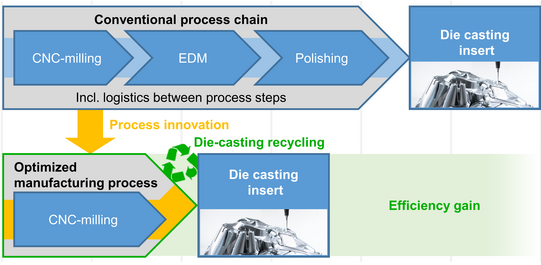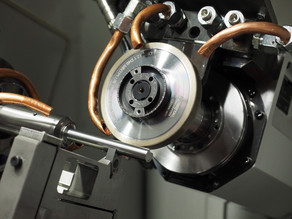Development of a process chain accelerated manufacturing process for the production of die-cast mold inserts based on a simulation-based methodology and resource-efficient recycling approaches
The production of molds, die casting molds, injection molds and forging dies is characterized by high demands on the quality of the machined surfaces of workpieces made of difficult-to-machine materials. For this reason, multi-stage process chains are used. Milling is usually followed by erosion processes to produce particularly deep cavities, which cannot be finished reliably in the milling process and often require manual polishing to achieve the desired surface quality. Milling is of central importance in the context of shaping, since the highest possible material removal rates can be achieved. When machining hardened, difficult-to-machine tool steels, which are very often machined in tool and die making, high process forces can be involved. Since long-projecting and thus flexible milling tools must be used for milling deep cavities, the risk of the occurrence of dynamic interference effects, such as regenerative chatter, is comparatively high. In many cases, therefore, less productive EDM operations are used, whereby the sequential linking of different process types, which in some cases spans several companies, leads to high proportions of non-productive time, which is why it can take up to 20 days to process an order after delivery of the blank. In addition, the linking of different machining processes leads to considerably higher logistical and administrative costs. The necessary measuring of the component is a time-consuming process and an additional source of error. The surfaces produced in the EDM process would always have to be reworked in a polishing process, for example, and usually have unfavorable properties with regard to the surface edge zone, such as tensile residual stresses.
By developing a new manufacturing process using simulation-based process optimization methods, the present project aims to realize "express manufacturing" of die-cast mold inserts. The consistent use of simulation techniques should enable a considerable shortening of process chains and reduced planning and process runtimes. An acceleration of quotation preparation and delivery times achievable with the new manufacturing process can thus secure a competitive advantage. In this context, resource efficiency plays a central role in multiple respects: The acceleration of production processes ties up resources such as employees, machines, tools and storage space for a shorter period of time. Customers only need to stock spare parts to a lesser extent, and the introduction of a method for recycling molds by reprocessing can save raw material resources and pre-machining steps.





![[Translate to English:] [Translate to English:]](/storages/isf-mb/_processed_/6/9/csm_AG_SimPro_Eyecatcher_1920p--_5f288a9cd4.jpg)